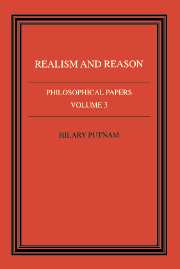Book contents
- Frontmatter
- Contents
- Dedication
- Introduction
- 1 Models and reality
- 2 Equivalence
- 3 Possibility and necessity
- 4 Reference and truth
- 5 ‘Two dogmas’ revisited
- 6 There is at least one a priori truth
- 7 Analyticity and apriority: beyond Wittgenstein and Quine
- 8 Computational psychology and interpretation theory
- 9 Reflections on Goodman's Ways of Worldmaking
- 10 Convention: a theme in philosophy
- 11 Philosophers and human understanding
- 12 Why there isn't a ready-made world
- 13 Why reason can't be naturalized
- 14 Quantum mechanics and the observer
- 15 Vagueness and alternative logic
- 16 Beyond historicism
- Bibliography
- Acknowledgements
- Index
9 - Reflections on Goodman's Ways of Worldmaking
Published online by Cambridge University Press: 06 January 2010
- Frontmatter
- Contents
- Dedication
- Introduction
- 1 Models and reality
- 2 Equivalence
- 3 Possibility and necessity
- 4 Reference and truth
- 5 ‘Two dogmas’ revisited
- 6 There is at least one a priori truth
- 7 Analyticity and apriority: beyond Wittgenstein and Quine
- 8 Computational psychology and interpretation theory
- 9 Reflections on Goodman's Ways of Worldmaking
- 10 Convention: a theme in philosophy
- 11 Philosophers and human understanding
- 12 Why there isn't a ready-made world
- 13 Why reason can't be naturalized
- 14 Quantum mechanics and the observer
- 15 Vagueness and alternative logic
- 16 Beyond historicism
- Bibliography
- Acknowledgements
- Index
Summary
Is there a privileged basis?
One of the most important themes in Goodman's (1978) Ways of Worldmaking (WoW) is that there is no privileged basis. Reducing sense data to physical objects or events is an admissible research program for Goodman; it is no more (and no less) reasonable than reducing physical objects to sense data. As research programs, there is nothing wrong with either physicalism or phenomenalism; as dogmatic monisms there is everything wrong with both of them.
This is decidedly not the fashionable opinion today. Physicalism and ‘realism’ are at the high tide of fashion; phenomenalism has sunk out of sight in a slough of philosophical disesteem and neglect. Goodman's assumption that physicalism and phenomenalism are analogous would be disputed by many philosophers.
It is this assumption that I wish to explain and defend before considering other aspects of WoW. Because it runs so counter to the fashion, it is of great importance to see that it is correct. At the same time, the analogy leads directly to the heart of Goodman's book, which is its defense of pluralism.
In WoW, Goodman points out that the phenomenal itself has many equally valid descriptions. In his view, this arises from two causes. First of all, perception is itself notoriously influenced by interpretations provided by habit, culture, and theory. (Goodman's long and close acquaintance with actual psychological research shines through many sections of WoW.) We see toothbrushes and vacuum tubes as toothbrushes and vacuum tubes, not as arrangements of color patches.
- Type
- Chapter
- Information
- Philosophical Papers , pp. 155 - 169Publisher: Cambridge University PressPrint publication year: 1983



